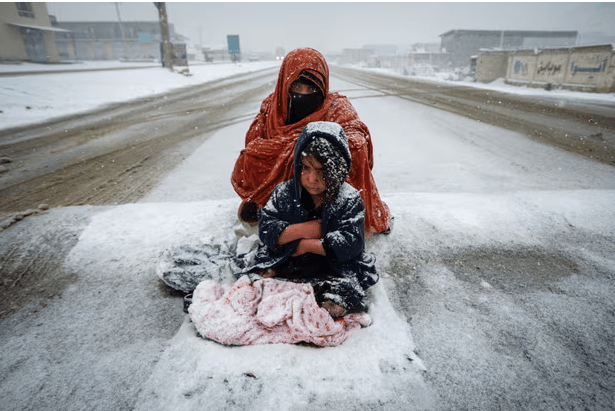
Destitute Afghan women arrested for begging under draconian new Taliban laws have spoken of “brutal” rapes and beatings in detention.
Over the past few months, many women said they had been targeted by Taliban officials and detained under anti-begging laws passed this year. While in prison, they claim they were subjected to sexual abuse, torture and forced labour, and witnessed children being beaten and abused.
All the women said they had no other option to begging on the streets for money and food for their children after being unable to find paid work.
Since the Taliban took power in August 2021, women have been barred from most paid work, which has seen levels of destitution, especially among female-led households, increase across the country.
In May, the Taliban passed new laws prohibiting “healthy people” from begging on the streets if they had enough money on them to pay for one day’s food.
A commission was established to register beggars and categorise them as “professional”, “destitute” or “organised”, which involves taking their biometric data and fingerprints. According to Taliban officials, nearly 60,000 beggars have already been “rounded up” in Kabul alone.
Zahra*, a 32-year-old mother of three, said she was forced to move to Kabul and beg on the streets for food when her husband, who was in the national army of the former government, disappeared after the Taliban took power in August 2021.
“I went to the neighbourhood councillor and told him I was a widow, asking for help to feed my three kids,” she said. “He said there was no help and told me to sit by the bakery [and] maybe someone would give me something.”
Zahra said she was unaware of the Taliban’s anti-begging laws until she was arrested.
“A Taliban car stopped near the bakery. They took my son by force and told me to get in the vehicle,” she said. Zahra claimed she spent three days and nights in a Taliban prison and that initially she was made to cook, clean and do laundry for the men working there.
She was then told she would be fingerprinted and have her biometric details recorded. When she resisted, she was beaten until she was left unconscious. She said she was then raped.
“[Since being released] I’ve thought about ending my life several times, but my children hold me back,” she said. “I wondered who would feed them if I weren’t here.
“Who can I complain to? No one will care, and I’m afraid they’d arrest me again if I spoke up. For my life and my children’s safety, I can’t say anything.”
Another woman, Parwana*, said she was detained while begging in Kabul in October with her four-year-old daughter after her husband abandoned them. She said she was taken to Badam Bagh prison and held for 15 days.
“They brought in everyone, even young children who polished shoes on the streets,” she said. “They’d tell us women why don’t we get married, beat us, and make us clean and wash dishes.”
Parwana also said she, along with another two women, was raped while in detention and that the attack had left her traumatised and depressed.
Along with multiple reports of rape and torture of women arrested under the anti-begging laws, former detainees also told the Afghan news outlet Zan Times that they witnessed the abuse of young children in prison, with one woman alleging that two children were beaten to death while she was in detention.
“No one dared speak,” she said. “If we spoke up, they’d beat us and call us shameless. Watching those children die before my eyes is something I’ll never forget.”
The death of detainees rounded up under anti-begging laws is factored into the wording of the Taliban’s new law, in which Article 25 states: “If a beggar dies while in custody and has no relatives or if the family refuses to collect the body, the municipal officials will handle the burial.”
Under the new laws, those classed as “destitute” are legally entitled to financial assistance after their release, but none of the women said they had received any help.
Parwana said that since her release she had been too afraid to beg for food again and instead relied on her neighbours for handouts.
“These days, I go door to door in my neighbourhood, collecting stale, dry bread. I have no other choice,” she said. “The Taliban are brutal and oppressive but where can I go to complain about them? We are alone.”






